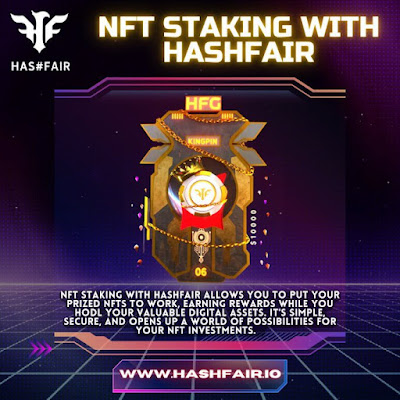HashFair: explores the leading DAO-based, decentralized online Web3 game
INTRODUCTION
The failure of Web 1.0 and 2.0 to become an intervention-free, safe, and convenient internet ecosystem has triggered crypto developers to create the latest version of the web on top of the blockchain.
Shortly after Bitcoin and altcoins became a trending financial topic, the metaverse and NFT emerged as prima donna in 2021. However, technological progress never seems to sleep, so without a long pause, a new topic of discussion regarding the world of blockchain was born in early 2022: Web 3.0.
The emergence of Web 3.0 was enthusiastically welcomed by blockchain activists and developers, who believed that Web 3.0 was the future version of the internet. Blockchain, which was originally known only to facilitate cryptocurrency transactions, is currently being developed so that it can regulate and maintain privacy on the internet independently.
Based on public-type blockchain technology, Web 3.0 is decentralized. That means, you no longer need media or web browsers from sources such as Google, Apple, or Meta to be able to access the internet.
This article explores the leading DAO-based, decentralized online Web3 game.
What is Hashfair?
HashFair is an innovative online games platform pioneering the integration of Web 3.0 technologies within the gaming industry. Built upon the robust infrastructure of blockchain technology, decentralized finance (DeFi), and smart contracts, HashFair has introduced the world’s first decentralized dealer. Operating autonomously on an immutable smart contract, this decentralized dealer is a groundbreaking feature that has the potential to revolutionize the online gaming landscape
Key Features
HashFair offers a decentralized and transparent gaming ecosystem that sets us apart from traditional centralized online gaming systems. Here's a breakdown of the differences and a SWOT analysis highlighting why HashFair is the better choice:
- Transparency and Trust:
Centralized System: In a centralized system, players must trust that the operator is fair and transparent, without any means to independently verify the outcomes.
HashFair: We leverage blockchain technology to ensure transparency and trust. Every game outcome is derived from decentralized smart contracts, providing a verifiable and tamper-proof record of fairness.
HashFair: We leverage blockchain technology to ensure transparency and trust. Every game outcome is derived from decentralized smart contracts, providing a verifiable and tamper-proof record of fairness.
- Security and Control:
Centralized System: Centralized platforms require players to deposit and hold funds within the platform, leaving them vulnerable to risks such as hacking or fund mismanagement.
HashFair: With HashFair, players maintain control over their funds in their own decentralized Web 3.0 blockchain wallets, minimizing the risk of fund loss and enhancing security.
- Immutable Game Rules:
Centralized System: In a centralized system, game rules can be subject to change or manipulation, impacting the fairness of gameplay.
HashFair: Game rules on HashFair are written on decentralized smart contracts, ensuring they remain unalterable and transparent. Players can trust that the rules are consistently applied, providing a fair gaming experience.
- Fair Profit Distribution:
Centralized System: In a centralized system, profits generated by the platform are typically retained by the operator, with limited benefits for the players.
HashFair: We believe in community-driven success. HashFair automatically distributes 80% of profits to an exclusive NFT pool, benefiting the community. Additionally, 20% of profits are burned, increasing the value for token holders.
The Dealer Contract
The HashFair Dealer Contract is primarily responsible for managing the supply of HFG Tokens and distributing profits among NFT holders. However, it does not directly handle gaming round transactions. The gaming round transactions are typically handled by other contracts or components of the HashFair platform.
In the context of a gaming round, the Dealer Contract may be involved in the following ways:
- Token Transfer: When a player participates in a gaming round, they may need to transfer HFG Tokens to a specific contract or address to place their bets. The Dealer Contract can facilitate this token transfer by allowing players to interact with it and transfer their HFG Tokens to the appropriate gaming contract.
- Profit Distribution: After a gaming round is completed and profits are generated by the platform, the Dealer Contract receives a portion of these profits from the platform’s profit calculation mechanism. The Dealer Contract then distributes a percentage of this profit (usually 1%) among the NFT holders according to their stake in the platform.
- Updating Token Balances: As profits are distributed to NFT holders, the Dealer Contract updates the token balances of each holder based on their share of the profit. This ensures that the NFT holders' HFG Token balances accurately reflect their earnings.
It’s important to note that the specific implementation and details of gaming round transactions may vary depending on the architecture and design of the HashFair platform. The Dealer Contract’s role in gaming round transactions would be defined by the platform’s smart contract infrastructure and how it interacts with other components involved in gaming round operations.
Token Details
- Name: HashFair
- Symbol: HFG
- Total Supply: 2,000,000,000 HFG
- Contract Address: https://polygonscan.com/token/0x681E04eA8F903da45A6520eE1e5F4B21b4503fcf
- Blockchain: Polygon Mainnet
#HashFairGames #HashFair #HFG #blockchain #cryptocurrency #technology #bitcoin #money #crypto #Binance #BNB #cryptocurrencies #fintech @Hashfair_Games
Join the HashFair community
Forge strategic partnerships with established online gambling operators and industry influencers to accelerate growth.
- WEBSITE: https://hashfair.io
- FACEBOOK: https://www.facebook.com/hashfairgames
- TWITTER: https://twitter.com/hashfair_games
- TELEGRAM: https://t.me/HashFairgames
- MEDIUM: https://medium.com/@hashfairgames
- YOUTUBE: https://www.youtube.com/@hashfairgames
- REDDIT: https://www.reddit.com/r/Hashfair/
- GITHUB: https://github.com/thehashfairgames
Author
Forum Username: Ce_iyang
Forum Profile Link: https://bitcointalk.org/index.php?action=profile;u=3540895
Pollygon Wallet Address: 0x9e7909673F655DFc9A2fcD82Ce49227DA4eBA6e3


Komentar
Posting Komentar